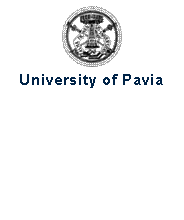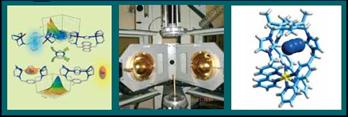
|
The University of Pavia Doctorate College |

|
Doctorate in Chemistry |
|
Research Areas The Doctorate covers the following areas: - Chemistry and Physical Chemistry of Materials; - Synthesis, Structure and Reactivity of Organic and Inorganic Molecules; - Advanced Analytical Methods.
Objectives The training objective is to prepare graduates suited to University teaching and research bodies and employment in chemical industries as well as in the service sector. The syllabus requires every doctoral student to carry out full-time research on an original subject of noteworthy and current scientific interest, under the guidance of a teacher-tutor. Activities in first two years relate to cycles of lessons within specifically instituted courses which provide advanced instruments on the thematics of the chosen area, the organisation of, and participation, as a speaker, in two seminars assigned by the Teaching Council ( Collegio dei Docenti), on avant-garde subjects in the field of chemistry; research students must also present a yearly report, in the form of a seminar, on the results of their research activity. At the end of the third year, research students write their thesis which is discussed in the final exam.
Research Projects Main research topics: - Synthesis and characterization of innovative materials for functional applications; - Isolation and structure determination of natural products and their stereoselective total syntheses - 1,3-dipolar cycloadditions from synthetic and theoretic point of view and the reactivity of the resulting five-membered heteorcycles; - Chiral catalysts for asymmetric synthesis: new chiral ligands and their use in the asymmetric catalysis of C-C bond forming reactions; - Green synthetic methods for a sustainable chemistry, in particular microwave assisted reactions and photochemical reactions; - Computational methods applied to molecular modelling with regard to bio-organic problems; |
|
Prof. MAURIZIO LICCHELLI |
|
For more information: |

|
- Transient reactive intermediates for selective targeting of nucleic acids and enzymatic inhibition with pharmacological and diagnostic applications; - Supramolecular assembly of synthetic, cyclic molecular modules in oriented tubular and helical nanoobjects for functional applications; - Design of concave molecular systems (receptors) for the selective inclusion of anions; - Self-assembling processes driven by metal ions; - Fluorescent and colorimetric chemosensors for cationic and anionic substrates; - New polymeric materials as protecting agents of stones used in the field of cultural heritage; - Complexing properties of natural organic matter (NOM) for trace metal ions in the environment, and dependence on climate changes; - Characterization of new solid sorbents and their analytical applications for solid phase extraction (SPE) and chromatographic procedures; - Electrode surface modification by SAM (Self-Assembled Monolayers) and nanomaterials, for electrochemical applications; - Synthesis and characterization of Molecular Imprinted Polymers (MIP) as biomimetic receptors for molecular species; - Study of the structure activity relationship in metal enzymes and model complexes; - Study, at the molecular level, of neurodegenerative processes.
International Projects The PhD Programme is supported by the scientific cooperation with Italian and foreign Institutions and Universities. The Research Doctorate in Chemistry has obtained approval for the European Research Doctorate in Chemistry, in which 42 European Universities are participating from the European Union’s Socrates Office. |
